人教版PEP小学英语教材知识梳理
- 格式:doc
- 大小:182.00 KB
- 文档页数:16
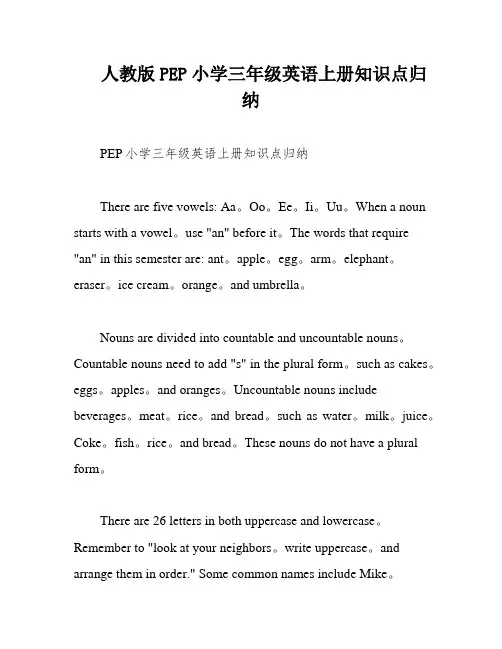
人教版PEP小学三年级英语上册知识点归纳PEP小学三年级英语上册知识点归纳There are five vowels: Aa。
Oo。
Ee。
Ii。
Uu。
When a noun starts with a vowel。
use "an" before it。
The words that require "an" in this semester are: ant。
apple。
egg。
arm。
elephant。
eraser。
ice cream。
orange。
and umbrella。
Nouns are divided into countable and uncountable nouns。
Countable nouns need to add "s" in the plural form。
such as cakes。
eggs。
apples。
and oranges。
Uncountable nouns include beverages。
meat。
rice。
and bread。
such as water。
milk。
juice。
Coke。
fish。
rice。
and bread。
These nouns do not have a plural form。
There are 26 letters in both uppercase and lowercase。
Remember to "look at your neighbors。
write uppercase。
and arrange them in order." Some common names include Mike。
Chen Jie。
Wu Yifan。
Sarah。
Zip。
John。
Miss Green。
Mr。
Jones。
and Zoom (Ms。
and Mr。
are used to address women and men。
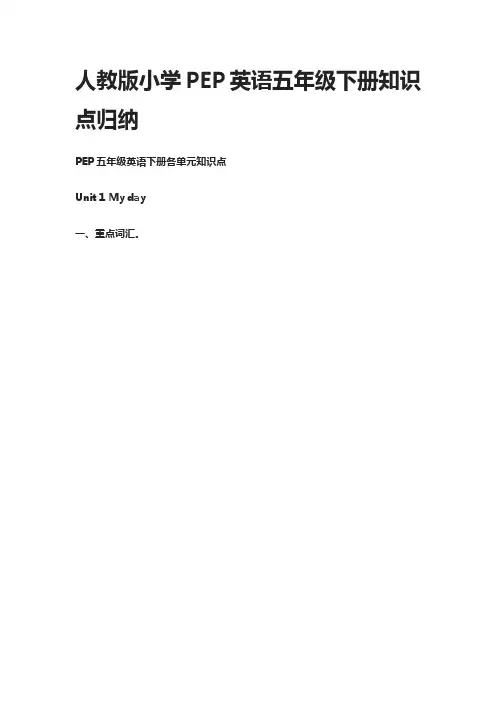
人教版小学PEP英语五年级下册知识点归纳PEP五年级英语下册各单元知识点Unit 1 My day一、重点词汇。
五、重点句型。
1、询问别人什么时候做某事的句型及回答。
句型结构:问:When do you+动词短语原形+其他?(你/你们什么时候做某事?)答:I/We(+频度副词)+动词短语原形+at+具体时间(我/我们通常在几点做某事。
)例:问:When do you go to bed?(你什么时候上床睡觉?)答:I go to bed at 9:00p.m (我晚上9点上床睡觉。
)注意:当主语是第三人称单数(he,she,it,单个人名或单数名词)时,助动词do 要变成does,句型结构是:When does+主语(第三人称单数)+动词短语原形+其他?2、询问别人周末做什么的句型及回答。
句型结构:问:What do you do on theweekend?(你周末做什么?)答:I(+频度副词)+动词(短语)+其他。
例:问:What do you do on theweekend?(你周末做什么?)答:I usually read books. (我通常看书。
)注意:当主语是第三人称单数(he,she,it,单个人名或单数名词)时,助动词do 要变成does,句型结构是:What does+主语(第三人称单数)+do+on the weekend?六、四会句子:When do you finish class in the morning ? 你们上午的课到几点结束?We finish class at 1 o’clock . 我们一点钟结束上午的课。
What do you do on the weekend ? 你周末做什么?I often watch TV and play ping-pong with my father . 我经常看电视,也常和我爸爸一起打乒乓球。
七、语音:cl /kl/ clean clock class cleverpl /pl / plate eggplant please play Unit 2 My favourite season三、重点句型1、询问别人天气怎么样的句型及回答。
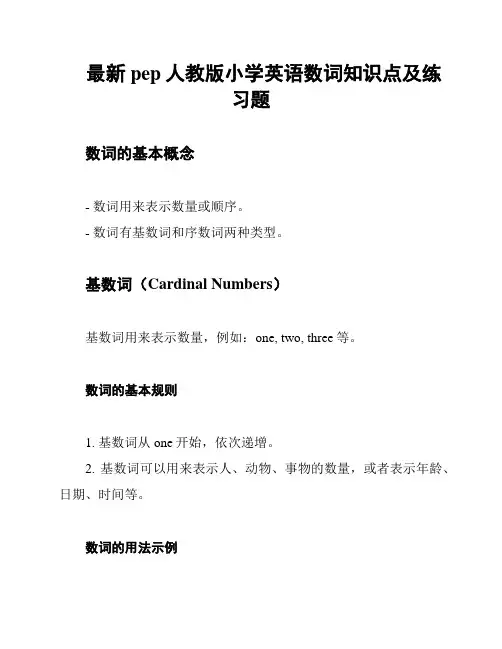
最新pep人教版小学英语数词知识点及练习题数词的基本概念- 数词用来表示数量或顺序。
- 数词有基数词和序数词两种类型。
基数词(Cardinal Numbers)基数词用来表示数量,例如:one, two, three等。
数词的基本规则1. 基数词从one开始,依次递增。
2. 基数词可以用来表示人、动物、事物的数量,或者表示年龄、日期、时间等。
数词的用法示例- There are five students in the classroom.five students in the classroom.- My sister has two dogs.two dogs.- Today is the third of June.third of June.- He is ten years old.ten years old.序数词(Ordinal Numbers)序数词用来表示顺序或次序,例如:first, second, third等。
数词的基本形式序数词的基本形式大致与基数词相同,只是在表示顺序时有所变化。
数词的用法示例- She is the first person in line.first person in line.- We are in the second row.second row.- Today is the third of June.third of June.- They arrived fourth at the finish line.fourth at the finish line.练题请根据给出的句子,填入适当的基数词或序数词。
1. There are ________ students in the class. (seven)2. Today is the ________ of December. (twenty-fifth)3. My sister is the ________ child in our family. (youngest)4. This is the ________ time I've been to this restaurant. (second)答案:1. There are seven students in the class.seven students in the class.2. Today is the twenty-fifth of December.twenty-fifth of December.3. My sister is the youngest child in our family.youngest child in our family.4. This is the second time I've been to this restaurant.second timeI've been to this restaurant.注意:本文档内容仅供参考,具体内容以教材为准。
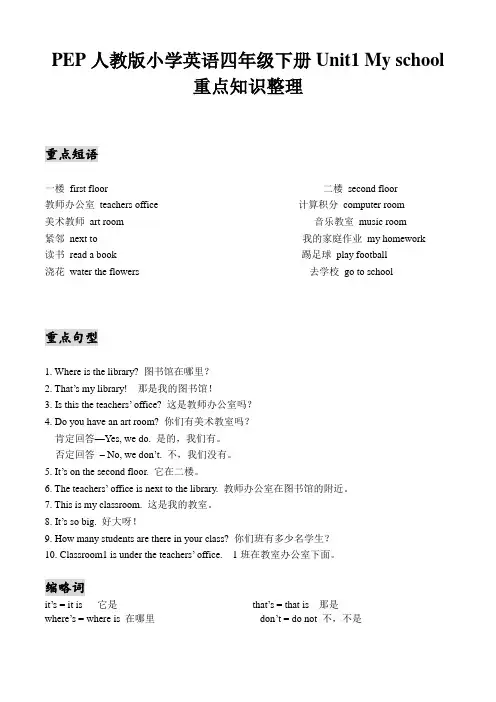
PEP人教版小学英语四年级下册Unit1 My school重点知识整理重点短语一楼first floor 二楼second floor教师办公室teachers office 计算积分computer room美术教师art room 音乐教室music room紧邻next to 我的家庭作业my homework读书read a book 踢足球play football浇花water the flowers 去学校go to school重点句型1. Where is the library? 图书馆在哪里?2. That’s my library! 那是我的图书馆!3. Is this the teachers’ office? 这是教师办公室吗?4. Do you have an art room? 你们有美术教室吗?肯定回答—Yes, we do. 是的,我们有。
否定回答– No, we don’t. 不,我们没有。
5. It’s on the second floor. 它在二楼。
6. The teachers’ office is next to the library. 教师办公室在图书馆的附近。
7. This is my classroom. 这是我的教室。
8. It’s so big. 好大呀!9. How many students are there in your class? 你们班有多少名学生?10. Classroom1 is under the teachers’ office. 1班在教室办公室下面。
缩略词it’s = it is 它是that’s = that is 那是where’s = where is 在哪里don’t = do not 不,不是重点句型※This is …这是……※That is…那是……句式变化规则表Be 动词的用法。
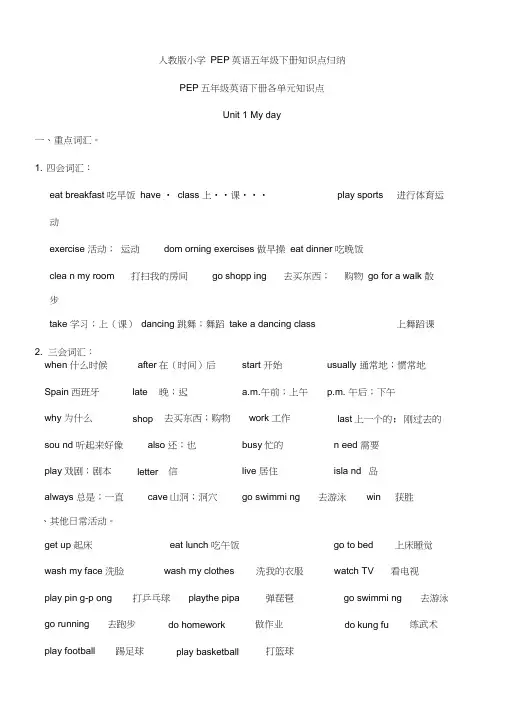

PEP新版三年级上册复习资料pen (钢笔) pencil (铅笔) pencil-box ( 铅笔盒) ruler(尺子) eraser(橡皮) crayon (蜡笔) book (书) bag (书包) no(不)your(你的)purple (紫色的) white (白色的) black (黑色的) orange (橙色的) pink (粉色的)brown (棕色的) ok (好,行) mum (妈妈)牢记下面的对话,会让你的英语说得更棒!(A是上句,B是答句)1、早上相见应该说A: Good morning.早上好B:Good morning!早上好!2、下午相见应该说―A: Good afternoon!下午好B: Good afternoon!下午好!3、跟新朋友第一次见面――A: Nice to meet you! 见到你很高兴。
B: Nice to meet you,too! 见到你也很高兴!4、A: This is Mr Jones 这是琼斯先生。
B: Nice to meet you! 见到你很高兴。
5、A: Colour it brown.把它涂成棕色吧!B: Ok 好。
读读,记记下面的句子。
你会很棒的!1. Show me green. 给我看看绿色。
2. Show me red. 给我看看红色。
3. Show me blue. 给我看看红色。
4. Show me yellow. 给我看看黄色。
5. Black, black. Stand up. 黑色,黑色,站起来(起立)!6. Orange, orange. Sit down. 橙色,橙色。
坐下。
7. White, white. Touch the ground. 白色,白色,摸摸地。
8. Brown, brown.Turn around. 棕色,棕色,转个圈。
5. I see green. 我看见绿色。
以下单词建议会拼写。
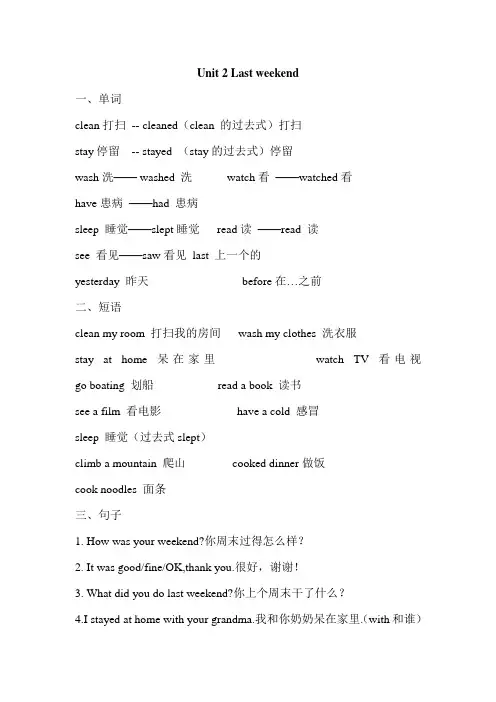
Unit 2 Last weekend一、单词clean打扫-- cleaned(clean 的过去式)打扫stay停留-- stayed (stay的过去式)停留wash洗—— washed 洗watch看——watched看have患病——had 患病sleep 睡觉——slept睡觉read读——read 读see 看见——saw看见last 上一个的yesterday 昨天before在…之前二、短语clean my room 打扫我的房间wash my clothes 洗衣服stay at home 呆在家里watch TV 看电视go boating 划船read a book 读书see a film 看电影have a cold 感冒sleep 睡觉(过去式slept)climb a mountain 爬山cooked dinner做饭cook noodles 面条三、句子1. How was your weekend?你周末过得怎么样?2. It was good/fine/OK,thank you.很好,谢谢!3. What did you do last weekend?你上个周末干了什么?4.I stayed at home with your grandma.我和你奶奶呆在家里.(with和谁)5. Did you do anything else?你还做了其他什么事吗?6. Yes,I cleaned my room and washed my clothes.是的,我扫了房间,还洗了衣服。
7.I want to buy the new film magazine.我想买期新的电影杂志。
8.Did you see a film?你看电影了吗?No,I didn’t .I had a cold. I stayed at home all weekend and slept.没有,我感冒了。
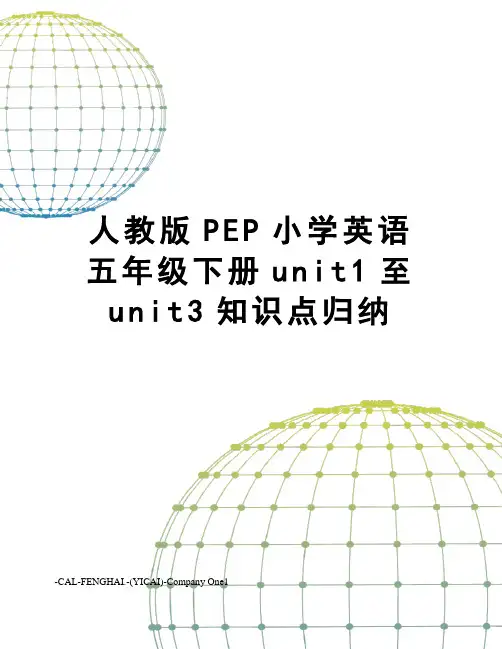
人教版P E P小学英语五年级下册u n i t1至u n i t3知识点归纳-CAL-FENGHAI.-(YICAI)-Company One1五年级下册Unit 1-3重点难点、单元单词、短语和知识点知识梳理第一单元知识点一、主要单词:do morning exercises晨练,做早操 eat breakfast吃早饭 have English class上英语课 play sports进行体育活动 eat dinner吃晚饭 eat lunch吃午饭 climb mountains爬山 go shopping购物,买东西 play the piano弹钢琴 visit grandparents看望(外)祖父母 go hiking去远足二、主要句子:When do you eat dinner你什么时候吃晚饭I eat dinner at 7:00 in the evening.我晚上七点吃晚饭。
When do you get up你什么时候起床I usually get up at 12:00 at noon.我通常在中午12点起床。
What do you do on the weekend你在周末干什么Usually I watch TV and go shopping.我通常看电视和购物。
Sometimes I visit my grandparents.有时候我去看望我的外祖父母。
I often play football.我经常踢足球。
Sometimes I go hiking.有时候我去远足。
三、同义词eat breakfast—have breakfast eat lunch—have luncheat dinner—have dinner play sports—do sports usually—often复数形式:policeman—policemen policewoman—policewomen现在分词:tell—telling三单:say—says同义句:What do you do ---What are you你是干什么的四、表示频度的副词:always总是,一直 usually通常,常常 often经常 sometimes有时候五、以复数形式出现的词组:visit grandparents plant trees介词后跟表示时间的词语时,表示在某年、某月、某个季节,某个时候(在上午,在下午,在晚上)用in;表示在某一天,在星期几用on,在具体的几点几分用at.七、too 和either的用法区别:too和either都是“也”的意思,但too用于肯定句,either用于否定句。
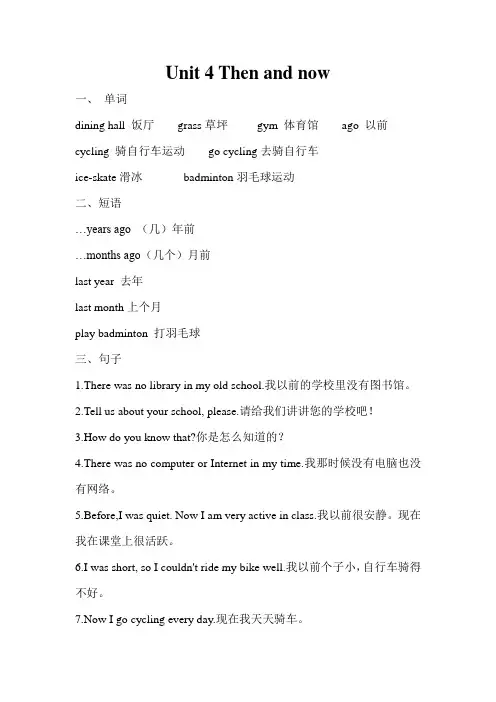
Unit 4 Then and now一、单词dining hall 饭厅grass草坪gym 体育馆ago 以前cycling 骑自行车运动go cycling去骑自行车ice-skate滑冰badminton羽毛球运动二、短语…years ago (几)年前…months ago(几个)月前last year 去年last month上个月play badminton 打羽毛球三、句子1.There was no library in my old school.我以前的学校里没有图书馆。
2.Tell us about your school, please.请给我们讲讲您的学校吧!3.How do you know that?你是怎么知道的?4.There was no computer or Internet in my time.我那时候没有电脑也没有网络。
5.Before,I was quiet. Now I am very active in class.我以前很安静。
现在我在课堂上很活跃。
6.I was short, so I couldn't ride my bike well.我以前个子小,自行车骑得不好。
7.Now I go cycling every day.现在我天天骑车。
四、作文: Last weekendI was busy last weekend. Saturday morning , I did my homework . Then, I visited my grandparents. In the afternoon, I went swimming with my friends. Sunday morning, my parents and I went to a park. We went boating and flew kites. It was a happy weekend.六年级下册单元知识点第四单元四会单词:learn Chinese—learned Chinese学汉语sing and dance—sang and danced 唱歌和跳舞eat good food—ate good food吃好吃的食物take pictures—took pictures 照相climb—climbed 爬have—had buy presents—bought presents买礼物row a boat—rowed a boat 划船see elephant—saw elephant 看大象go skiing—went skiing 去滑雪go ice-skating—went ice-skating 去滑冰how怎么,如何get—got 到达last上一个的,仅余的,留在最后的四会句型:Where did you go on your holiday? 你去哪里度假了?I went to Xinjiang. 我去新疆了。
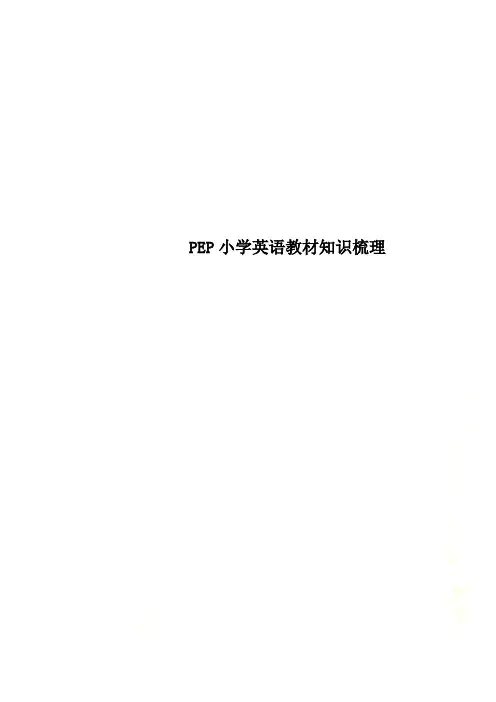
PEP小学英语教材知识梳理 三 年
级 上 册
Unit 1 Unit 2 Unit 3
Unit 4 We Unit 5 Unit 6 Happy
核心句型:1.I have.... 2.Hello/Hi,I’m…. 3.--What’s your name?-- My name’s….
核心词汇:ruler pencil eraser crayon bag pen
核心句型: 1.This is…. 2.Good afternoon/Good morning 3.--Nice to meet you. --Nice to meet you,
核心词汇:red green yellow blue black brown white
核心句型:1.--How are you?—I’m fine, thank you./Very well, thanks. 2.Look at…
核心词汇:face ear eye nose mouth arm hand head
核心句型:1.—What’s this? –It’s a/an… 2.—What’s that?—It’s a/an…3.Cool! I like it.
核心词汇:duck pig cat bear dog elephant monkey
核心句型:1.--I’d like some… ,please. –Here you are. 2.--Have some bread.—Thanks./Thank you. 3. –Can I have some…,please? –Here you are. –Thank you. –You’re welcome. 4.I’m hungry. 5. Have/Eat/Drink some….
核心词汇:bread juice egg milk water cake fish rice
核心句型:1.--How old are you?—I’m six./I’m six years old. 2.--How many plates?—Five.
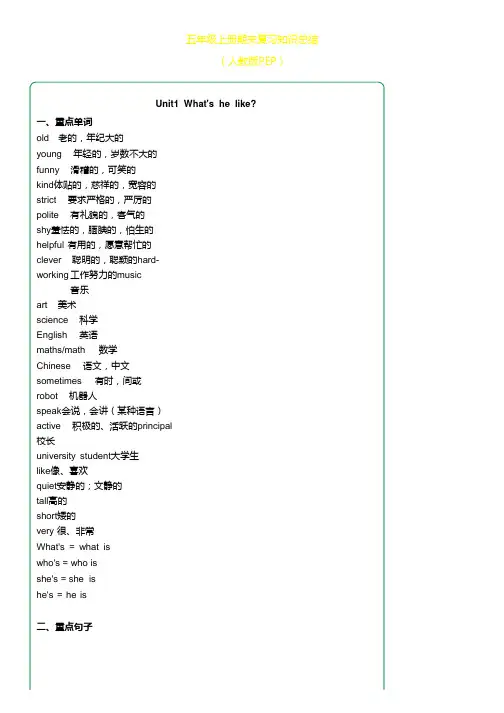
五年级上册期末复习知识总结(人教版PEP)Unit1 What's he like?一、重点单词old 老的,年纪大的young 年轻的,岁数不大的funny 滑稽的,可笑的kind体贴的,慈祥的,宽容的strict 要求严格的,严厉的polite 有礼貌的,客气的shy羞怯的,腼腆的,怕生的helpful 有用的,愿意帮忙的clever 聪明的,聪颖的hard-working 工作努力的music音乐art 美术science 科学English 英语maths/math 数学Chinese 语文,中文sometimes 有时,间或robot 机器人speak会说,会讲(某种语言)active 积极的、活跃的principal校长university student大学生like像、喜欢quiet安静的;文静的tall高的short矮的very 很、非常What's = what iswho's = who isshe's = she ishe's = he is二、重点句子(Who,What引导的特殊疑问句,用来对不熟悉的老师进行问答:Who's +某人?What's he /she like?He /She is +与身体特征和性格特征有关的形容词。
)1. 询问人—Who's your art teacher?谁是你的美术老师?—Mr.Jones.琼斯老师。
( Is引导的一般疑问句,谈论某位人是否具有某方面的特征:Is he /she +与身体特征和性格特征有关的形容词,回答用:Yes, he / she is. No, he / sheisn't. )2. —Is he young?他年轻吗?—Yes,he is.是的,他年轻。
或—No,he isn't.不,他不年轻。
—Is she strict?她很严格么?—Yes, she is , but she's very kind.是的,但她很和蔼的。
. 精品 人教版PEP小学英语教材知识梳理(3-6年级)
小学英语三年级上册教材梳理 1. Key words of each unit: Unit Topic Key words(三会) 四会
U 1 Greetings ruler, pencil, eraser, crayon, bag pen, pencil box, book. bag U 2 Colours red, green, yellow, blue, black, brown, white, orange. red U 3 Body face, ear, eye, nose, mouth, arm, hand, head, body leg, foot. nose U 4 Animals duck, pig, cat, bear, dog, elephant, monkey, bird, tiger, panda, zoo pig
U5 Food bread, juice, egg, milk, water, cake, fish, rice. cake U 6 birthday one, two, three, four, five, six, seven, eight, nine, ten. four 2. Main sentences in the text. Unit Topic Sentences 备注:红色的句子建议指导孩子进行简单的书空,有能力的学生可以练习书写,培养学生的对句子的书写习惯和意识。并且这些句子要进行替换性练习和造句。
以下同!
U 1 Greetings Hello, I’m Wu Yifan./Hi, I’m Sarah. I have a ruler/an eraser. What’s your name?/My name’s John. Goodbye!/Bye, Miss White. U 2 Colours Mr Jones, this is Miss Green. Good morning, Miss Green. /Good afternoon, Wu Yifan. I see red. Nice to meet you./Nice to meet you, too. U 3 Body How are you?/I’m fine, thank you. Let’s go to school! Look at me. Very well, thanks. Let’s make a puppet!/Great! U 4 Animals What’s this? /It’s a duck. What’s that?/Cool! I like it. U5 Food I’d like some juice, please./Here you are./Have some bread. I’m hungry! Can I have some water, please? You’re welcome. U 6 Birthday This one, please./Sure./How many plates? Happy birthday! How old are you?/I’m 6 years old. 3. Letters and sounds Unit 2 Aa ant apple Bb book bag Cc cat crayon Dd duck dog Unit 3 Ee egg elephant Ff face foot Gg green gift Hh hi hand Ii ice ice cream Unit 4 Jj jeep jump Kk kite Kate Ll long leg Mm milk mum Nn nose noodles Unit 5 Oo on orange Pp pig pen Qq queen quite Rr rice red Ss six Sarah Tt . 精品 tiger ten.
精品 Unit 6 Uu umbrella under Vv vet vest Ww wet water Xx fox box Yy yellow yo-yo
小学英语三年级下册教材梳理
1. Key words of each unit: Unit Topic Key words(三会) 四会
U 1 Introductions UK,Canada,USA, China, she, student, pupil, he, teacher. she he pupil
U 2 Family father, dad, man, woman, mother, sister, brother,grandmother,grandma, grandfather, grandpa. man woman mother father
U 3 Animals thin, fat, tall, short, long, small, big. tall short big U 4 Location on, in, under, chair, desk, cap, ball, car, boat, map. chair desk boat ball U5 Fruits pear, apple, orange, banana, watermelon, strawberry, grape. pear apple orange
U 6 Numbers eleven, twelve, thirteen, fourteen, fifteen, sixteen, seventeen, eighteen, nineteen, twenty. eleven twelve twenty 2. Main sentences in the text. Unit Topic Sentences
U 1 Introductions Welcome! Where are you from? I’m from the UK. U 2 Family Who’s that man? He’s my father. Who’s that woman? She’s my mother. Is she your mother? Yes, she is. Is he your father? No, he isn’t. U 3 Animals It’s so tall. Come here, children! It has a long nose . It has small eyes and big ears. U 4 Location Let’s go home. Where is my pencil box? Is it in your bag? No, it isn’t. / Yes, it is. Have a good time! U5 Fruits Honey, let’s buy some fruit. Do you like oranges? No, I don’t./Yes, I do. Sorry, I don’t like bananas. Me, neither. U 6 Numbers How many kites do you see?/The black one is a bird! How many crayons do you have? /Open it and see!
3. Letters and sounds 5个元音字母:Aa, Ee, Ii,Oo, Uu 元音字母在单词中的发音(短元音) Aa: cat bag hand dad Ee: ten red leg pen Ii: big six pig milk. 精品 Oo: dog box body orange Uu: fun run duck under
小学英语四年级上册教材梳理
1. Key words of each unit: Unit Topic Key words(三会) 四会
U 1 School classroom, window, blackboard, light, picture, door, teacher’s desk, computer, fan, wall, floor. computer, light,door, fan, floor
U 2 Schoolbag Schoolbag, maths book, English book, Chinese book, storybook, candy, notebook, toy, key. book, math, English, toy Chinese U 3 Friends strong, friendly, quiet, hair, shoe, glasses strong, hair, shoe
U 4 Family bedroom, living room, study, kitchen, bathroom, bed, phone, table, sofa, fridge. room, study, bed, kitchen table,key U5 Food beef, chicken, noodles, soup, vegetable, chopsticks, bowl, fork, knife, spoon. beef, soup, noodles,
U 6 Jobs parents, cousin, uncle, aunt, baby brother, doctor, cook, driver, farmer, nurse. brother, doctor, nurse,driver 2. Main sentences in the text. Unit Topic Sentences
U 1 School We have a new classroom. /Let’s go and see. Where is it?/It’s near the window. Let’s clean the classroom! Let me clean the windows. U 2 Schoolbag What’s in your schoolbag? An English book, a maths book, three storybooks and … What colour is it? /It’s blue and white. U 3 Friends What’s his name? His name is Zhang Peng. He’s tall and strong. Who is he?He has glasses and his shoes are blue. U 4 Family Is she in the living room? No, she isn’t. Where are the keys? Are they on the table? No, they aren’t. They’re in the door. U5 Food What’s for dinner? What would you like for? I’d like some soup and bread,please?(I’d like=I would like) Help yourself. Would you like a knife and fork? No, thanks. I can use chopsticks. U 6 Jobs How many people are there in your family? Three. My family has six people. Is this your uncle? Yes, it is. He’s a football player. What’s your aunt’s job? She’s a nurse. 3.Letters and sounds Aa: cake face name make Ii: like kite five nine rice Oo: nose note Coke Mr Jones Uu: use cute excuse Ee: me he she we